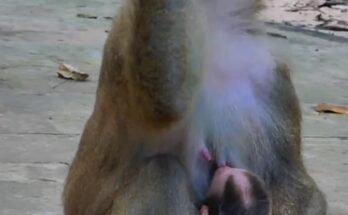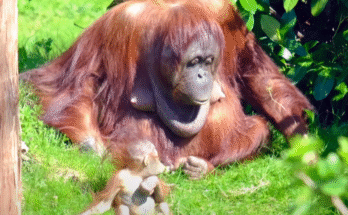In the dappled light of the forest canopy, a small baby monkey clings to a low-hanging branch, his body trembling with fear and confusion. His cries are soft at first—high-pitched whimpers—but they soon grow louder, more frantic. He reaches out toward his mother, Jade, a strong and assertive adult female known for her dominant personality within the troop. But instead of comforting her infant, she brushes him off with an impatient shove. Moments earlier, he had tried to nurse, only to be abruptly pushed away. Jade is weaning him, and she’s doing it on her own terms.
Weaning is a natural part of primate development. In the wild, all monkey mothers eventually stop allowing their young to nurse, encouraging them to eat solid foods and become more independent. But the process can be jarring and emotionally intense, especially when it happens suddenly or harshly. In this case, Jade’s behavior is not unusual for a dominant mother asserting boundaries, but to her baby, it feels like abandonment.
The baby monkey, still emotionally and physically dependent on his mother, doesn’t understand why the comfort of her milk is being denied. For weeks, perhaps months, nursing was not just nourishment but security, a guaranteed moment of closeness. Now, that comfort has been taken away without warning. His small body shakes—a mix of stress, fear, and helplessness—as he tries to make sense of the new reality.
This behavior, heartbreaking as it may appear, is a part of a broader developmental stage. In many monkey species, especially macaques and baboons, mothers begin weaning their infants as early as a few months old. The exact timing depends on factors like the mother’s health, social rank, and whether she is preparing for another pregnancy. Dominant females like Jade may wean earlier, confident that their offspring will adapt quickly under their firm guidance.
However, the emotional toll on the infant can be significant. Sudden or aggressive weaning often leads to increased vocal distress, clinging behavior, and even developmental delays in more sensitive individuals. In social troops, other monkeys—often older siblings, aunts, or juvenile females—may help buffer this stress by providing affection, grooming, or play. But if the troop is not close-knit, or if the baby is especially attached to its mother, the transition can be painful.
Primatologists studying weaning behaviors emphasize that while such scenes may appear cruel, they are part of the natural push-and-pull of growing up. Still, they also note that maternal style varies greatly—some mothers are gentle and gradual in their weaning, while others, like Jade, take a firmer approach.
The image of the baby monkey crying and shaking as Jade weans him may evoke deep sympathy, especially from human observers. It’s a reminder of how deeply emotions run through the animal kingdom, and how much a young life depends on its caregiver—not just for food, but for emotional security. In time, the baby will likely adjust, grow stronger, and learn to navigate his world. But for now, his cries echo through the treetops, a testament to the hard lessons of independence in the wild.


